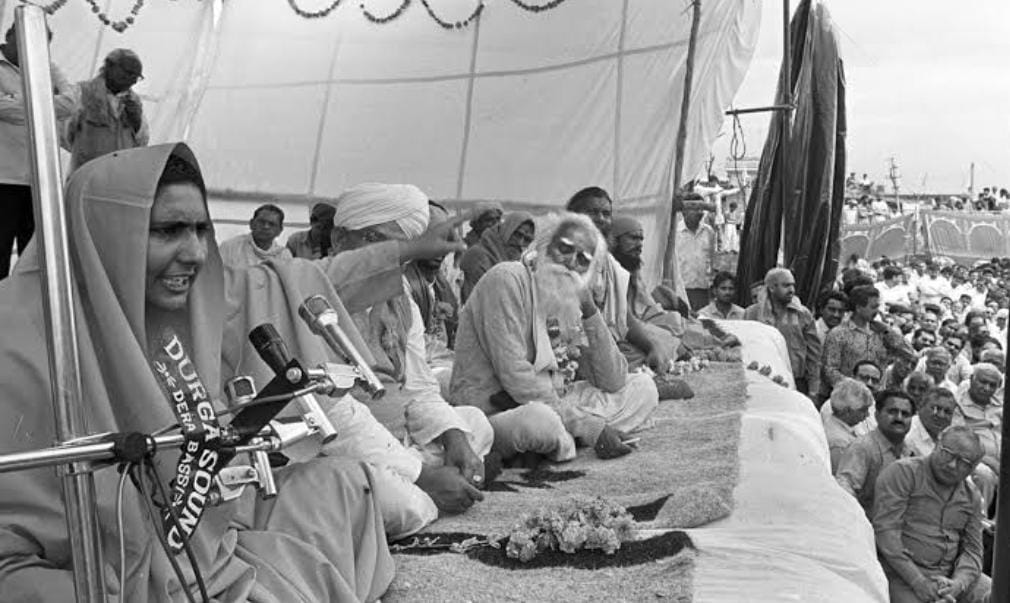
Sadhvi Rithambhara, who played a pivotal role in the Babri Masjid demolition and was charged in connection with the incident, has been awarded the Padma Bhushan this year in the social work category.
The recognition has sparked widespread controversy, given her long history of incendiary rhetoric and involvement in various communal controversies.
Rithambhara first rose to prominence in the late 1980s as a star speaker for the Vishwa Hindu Parishad (VHP), where her fiery speeches on the Ram Janmabhoomi movement gained considerable attention.
Her speeches, often described as the “most aggressive,” were broadcast on public loudspeakers, making her a vocal advocate for Hindu nationalism. According to political scientist Christophe Jaffrelot, these speeches helped shape the narrative of the Hindu nationalist movement in India.
In 1991, at the age of 25, Rithambhara was charged by the Delhi Police for provocative speeches that fueled communal tensions, particularly in relation to the Babri Masjid.
She was later named in the Liberhan Commission report, which investigated the demolition of the mosque on December 6, 1992.
The Commission listed her as one of the 68 individuals responsible for taking the country to the brink of communal discord.
The Central Bureau of Investigation (CBI) had also charged her, along with prominent figures like LK Advani, Murli Manohar Joshi, and Uma Bharti. However, in 2020, she was acquitted, along with all the other accused.
Following the demolition of Babri Masjid, Rithambhara continued to engage in divisive politics. In 1995, after the brutal murder of a Christian nun, Rani Maria, in Madhya Pradesh, she launched a tirade against Christians.
She famously warned, “If a single choti or janeu is cut, Christians will be wiped out from the face of India.”
Rithambhara also led the Durga Vahini, an offshoot of the VHP, whose activists were involved in violent protests.
In March 2002, Durga Vahini members, along with activists from the VHP and Bajrang Dal, vandalized the Odisha Assembly. Their protests were in response to criticisms by MLAs of their radical activities.
The group continued to engage in similar actions in subsequent years, including the blackening of faces of individuals who did not adhere to their views on Hindu culture and practices.
Rithambhara’s actions were not limited to the political sphere; she has been vocal on social issues as well.
In recent years, she has positioned herself as a social worker, heading the Samvid Gurukulam Girls Sainik School, one of several schools associated with Hindutva organizations like the RSS and the BJP.
In a video posted by the school’s Facebook page, she expressed her views on the behavior of young women today, criticizing them for what she termed “out of control” actions. She lamented women smoking, engaging in public displays of affection, and sharing “abusive reels” on social media.
She even went as far as to label these women as “mentally sick” and accused them of lacking “sanskar” (traditional values).
“What do we find in colleges? Girls smoking cigarettes at midnight. In these hubs of education, women are breaking liquor bottles, and spreading indecency with their boyfriends on motorcycles. We had never thought that the daughters of India would be so out of control. They are posting abusive reels on social media. They are doing nude photoshoots. They are showing off their bodies in undergarments. It seems that these women are mentally sick… These girls don’t have sanskar,” Rithambhara said in the video.
Rithambhara’s Padma Bhushan award has been met with mixed reactions. Supporters view her as a champion of Hindu causes and social reform, while critics argue that her past actions and statements should have disqualified her from receiving such an honor.
Her controversial legacy, marked by her divisive rhetoric and promotion of Hindu nationalism, continues to spark debate about her place in India’s social and political landscape.
Her recognition, particularly in light of her involvement in the Babri Masjid demolition and her later actions, has raised serious questions about the kind of values the Padma awards are meant to honor




